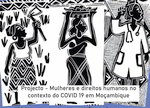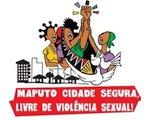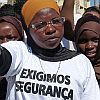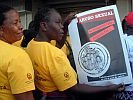Advocating legal reforms
Five articles published in national newspapers by:
WLSA Mozambique, AMMCJ, MULEIDE and Fórum Mulher
Wife batterers are not abnormal
There is now no denying that domestic violence exists, carried out largely by men against the women who depend on them. More and more women victims of domestic violence are making complaints, because of a climate more receptive to complaints and because of the establishment of places where such conflicts can be resolved, such as the Help Centres for Women and Child Victims of Violence (that operate in police stations) and some NGOs, (including AMMCJ, MULEIDE, the League of Human Rights and the OMM) that provide legal assistance to the victims of domestic violence. However, we know that the numbers are still very small in relation to the real number of women that are victims of violence, but we are beginning to see the magnitude of this problem and the frightening picture it reveals.
Verbal violence is a constant in almost all cases, including insults and disrespect for women’s dignity, good name and honesty, making them lose self-esteem and confidence. Sexual violence is also frequent, and worse still, it is not penalised because it happens in the context of marriage, and as such it is classified in the current Criminal Code as lawful (all sexual relations within marriage are lawful).
Physical violence is gaining in visibility. This consists of bodily assault, from the simple to the more serious, even “private jail” (denial of liberty). More disguised but no less serious is the economic violence, that results, for example, from the failure to provide sufficient maintenance or when the husband or partner takes community property from the family to keep it somewhere else or for an unknown purpose.
The life of women who suffer domestic violence is hopeless; they have no personal prospects, no joy. Their lives are subjugated and they lose faith in themselves and even in the capacity of institutions that provide such help or services to resolve their problems. At the same time, they feel ashamed of being ill-treated by their husband or partner and begin to be seen as being responsible for their situation: “what does she do to make her husband treat her like that”? Moreover, children who grow up in violent homes, even if they are not the direct targets of violence (which they often are), are extremely affected and grow up traumatised, tending often to imitate such behaviour when they are adults.
There is no way to deny this situation, and public awareness of the problem of domestic violence must be increased. It is not enough to think simply of legal reforms (which are urgently needed). We have to understand that such violence against women exists because it is based in the cultural and social values that regard women as inferior, that relegate them to the background at home and in society. Let’s look at some myths on the subject:
- Men who batter their wives are not abnormal; on the contrary, they are people who act in accordance with the prevailing system of values. They were brought up to exercise control at home, to be the head of the family, and as such they learned that the use of force is a legitimate way of imposing their authority. Faced with attempts to halt domestic violence, they are often heard to say: “There is no need to go so far, because only a few men batter their wives, and they are a bit sick and need psychiatric treatment”. Such positions contribute towards the problem of violence not being seen clearly and they certainly do not help in eliminating it.
- Batterers are not people given to indiscriminate violence, that is, they are not violent people who, when someone goes against them, react by attacking their friends or workmates. These people who batter their wives might even be orderly and well behaved in their work and informal relationships. Men that batter their wives, partners or girlfriends do it because they have learned that they have power over them.
- Men do not batter their wives because they have taken drink or other mind-altering drugs. Evidence shows that taking such substances lessens inhibition, causing people to commit deeds that they already had in mind. For example, one victim of violence said that when her husband got drunk and battered her, he gave reasons that had come up in previous arguments (sometimes years before) when he had not been drunk.
If we really want to combat domestic violence against women, we must first of all recognise a fundamental truth: women are the favourite target of this sort of violence because patriarchal values dominate our society and they sustain a hierarchy that gives power to men, allowing them to control the lives of their wives and partners.
LET US FIGHT FOR EQUAL RIGHTS BETWEEN MEN AND WOMEN!
Women don’t like “catching it”
Often, when this or that proposal is made to fight domestic violence, we hear that it is not worth doing anything because women like it. It is even said that they get cross when they don’t “catch it” because they think their husband doesn’t love them anymore. We are given such examples as: “My mother had a neighbour who…”, or “there was a woman in my village…”
Without trying to deny that some women might think in that way, this idea that “women like to catch it”, seems to be one more myth spread around to justify the phenomenon of domestic violence against women by those who should be lending them support and solidarity.
A system of domination needs the use of brute force to repress, constrain or punish. Furthermore, in order to impose itself, it requires a system of values that convinces others of the justice and legitimacy of its norms and practices. The very people who are oppressed are taught to view the world through the prism of this ideology, and they are often convinced that their oppressors are in the right.
Thus when we talk of fighting male domination and the subordination of women, we must be critical of the ideology that underlies the persistence and reproduction of the patriarchal system. It is not enough to pass laws or formulate public policies to change discriminatory practices; we must go to the root of the problem and question patriarchal values. And why? To call into question the “eternal truths” that seek to explain the social differences between men and women on the basis of their bodies.
This is how we must analyse the myths spread around about domestic violence, including those that most naively yet most persistently say that women need to be beaten to be convinced of their husband’s or partner’s love.
If anyone needs to confirm this, let them visit the Help Centres for Women and Children that function in some police stations, or the NGOs that deal with cases of domestic violence. Let them ask the women there if they like being constantly beaten and living in terror, without knowing what to do to avoid being assaulted again and suffering permanent anxiety. Nobody wants to go on living in such a situation of violence, but most of the women do not even know that they have a legally-guaranteed right to their physical integrity, dignity and good name.
If we really want to put an end to domestic violence against women, we have to be equally committed to passing laws against the primitive and antiquated mentality that still ranks women as second-class human beings who are irrational and unable to conduct their lives without male tutelage.
Violence against women is not just a female problem. It is a threat to the civilised society that we are seeking to build. As such, the solution to this problem requires the commitment of all women and all men in civil society and the government.
NO MORE VIOLENCE AGAINST WOMEN!
LET US FIGHT AGAINST VALUES THAT DISCRIMINATE ON GROUNDS OF SEX!
Women’s Human Rights in the current Criminal Code
The law always reflects the moral and ethical principles of a society and its age. It also reflects the correlation of power among the different interest groups. We must bear this in mind when we look at the current Criminal Code in Mozambique. It was passed and went into force in the 19th Century, with a few subsequent minor amendments.
The moral and ethical principles governing modern Mozambican society and which support the idea of democracy are not expressed in that legal instrument. And the glaring omission, the great deficit relates to women’s human rights, which, although they are expressed in the fundamental law, the Constitution of the Republic, are not reflected in some legal norms and practices. Why? Because these human rights have only gained visibility lately. For example, while most people recognise that discrimination on the basis of race or religion is inadmissible, discrimination by reason of sex is still tolerated in some places.
Given this situation, it is no wonder that the Criminal Code contains some gaps as to women’s human rights. But today, when women have won the right to exercise fully their citizenship and the concept of civilisation is compatible only with gender equality; such discrimination is no longer acceptable. There is need, therefore, to make a systematic analysis of the Criminal Code, to identify the major deficiencies and propose reforms.
At the same time, the forms assumed by certain types of violence against women are better known nowadays, and these must be classified and penalised. We are talking of sexual harassment, for example, in schools and other places, both public and private, which is now known to be growing to alarming proportions. Incest could also be mentioned, and sexual abuse committed in the home, which has remained unpunished. Nor can we fail to mention conjugal rape, when a woman is forced to engage in sexual practices that are not to her liking by the man she has married.
These are only some examples to show how men and women are dealt with differently in the Criminal Code in force, and which is an injustice that must be rectified, as the government’s plan foresees. Citizens must receive the same treatment before the law, regardless of which sex they belong to. And the problems affecting them are different, because of the very way in which society is organised, and should deserve an appropriate framework. The girls and women who are more often the victims of violence related to the structure of a patriarchal society need legal protection from these specific crimes.
FOR A FAIRER CRIMINAL CODE!
IN DEFENCE OF WOMEN’S HUMAN RIGHTS!
Rape within marriage is an assault on human rights
Under the legislation currently in force, provided that a man and a woman have contracted marriage, any sexual relations are classed as “lawful”, even if the sexual act is made by force and the husband has raped his wife. This archaic provision, which still prevails today, dates from 1866, when the Criminal Code was written and which remains the basis on which criminal law is practised Mozambique. It is no wonder, therefore, that it contains such a rule that gives the male spouse the right to control his wife’s body.
In fact, this male prerogative is also recognised by local cultures in Mozambique and many episodes of violence against women in the home are actually sexual attacks. Such sexual attacks go unpunished because, within marriage, this sort of violence is not classed as a crime, under the law, and is legitimate.
This situation must be resolved rapidly, in the name of the most elementary justice towards women, to whom the Constitution guarantees full rights as citizens of this country. It is not acceptable that, although they can vote and formally accede to all levels of decision-making, women are still deprived of this basic right to take decisions about their own body.
Women and men should be able to enjoy their sexuality in a free and pleasurable way, without fear, without worry and without pressure. Every woman and man, without exception, should be able to decide when, how and with whom they want to have sexual relations. Nobody, absolutely nobody should be forced into sexual practices that are not to their liking, and to which they have not consciously agreed.
There is the idea, spread around in some quarters, that men “naturally” have greater sexual appetites than women, which would give them legitimacy in leading and controlling the sex life of a couple. From that point of view, as some people maintain, violence would be the rejection by a women of the sexual advances of her husband or partner. First of all, the idea that men are sexually more vigorous than women is a myth, like so many others, propagated to strengthen male power. In the second place, no argument is good enough to support the position that society accept and institutionalise sexual violence within marriage.
For all these reasons and because we believe that development and democracy are only possible when there is justice for all women and men, we repeat:
- We want a society free from violence;
- We want the rights of all citizens to be guaranteed and respected;
- We want each woman and each man to be able to decide about their own body and sexuality.
IN DEFENCE OF WOMEN’S HUMAN RIGHTS!
NO TO FORCED SEXUAL RELATIONS IN MARRIAGE!
Incest must be punished
Many more voices are being raised to denounce a situation that up to now has remained hidden. We are talking of sexual abuse and harassment that affects mainly female children or girls, committed by fathers, stepfathers, uncles, brothers or other relatives. However, even when it is possible to prove that such crimes have been committed, the applicable legal norms are the same ones that apply to any sexual assault, regardless of the relationship the assailant has with the victim.
We argue that there is need to classify sexual assault committed by a relative as incest, as it is in the criminal law of many countries. Why? Because incest is much more than a sexual assault committed by a stranger, however painful and violent it may be. When the assailant is the father, uncle or brother of the victim, they possess a measure of control over the victim, who is normally a minor living in their care. Let us highlight the following aspects:
- Incest is always more than one episode of sexual violence. It is continuous domination over the victim at any time of the night or day, and its purpose is to ensure the victim’s silence and continued availability. A case of incest almost always signifies countless acts of sexual assault committed over a long period of time that could last for years.
- The victim of incest is more vulnerable, because she has nobody to complain to without suffering reprisals from her assailant. At the same time, the very person that she should go to for help is sometimes the assailant. Cases of incest already studied show that when the victim complains, this is denied by the assailant, who is an adult relative, and the other family members normally believe him.
We could look at it another way and say that incest is also a kind treachery by someone with a duty to protect, treachery against society and against democratic values. One of the most important duties is that of protecting our children. Every single one of us is personally responsible. For this reason, we argue that the new Criminal Code should class incest as a crime, with heavier penalties than those foreseen for other sexual assaults of minors.
Children have rights that nobody, not even their family, can put at risk. The State, as the guarantor of the full enjoyment of such rights, must work so that all children may live in peace and grow up with dignity, both within and outside the home.
FOR THE RIGHTS OF CHILDREN!
* * *







 Information in English
Information in English



















